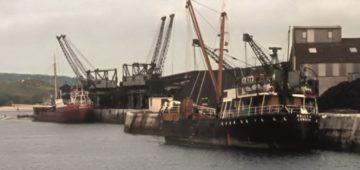It is with sadness that the majority of Seafarers will say “Farewell” to the BBC, four times a day Long Wave broadcast of the Shipping Forecast on 31“ March 2024. This will be caused by the “switching off” by Arqiva, of the three Long Wave transmitter stations, Droitwich, Westerglen and Burghead. This forecast has been broadcast since 1911.
How many of us listen to the regular broadcasts with a feeling of nostalgia of times past? And many many more who just love the cadences of speech which result from the terms, “Thames, Dover Wight”, “Sole Lundy Fastnet” or “Malin, Hebrides, Bailey”? The soporific effect is certain in many cases to return the listener to sleep at 0054 or 0521 hours!
My first recognised hearing of the Shipping Forecast was as a Cadet aboard the School of Navigation’s training vessel Moyana, when we were storm bound for a couple of days in Weymouth after a very bouncy ride into a heavy South Westerley swell on our way along the coast from the Solent. A rather fearful Cadet listened to that Forecast waiting for the weather to improve so that we commence our return journey.
As my career progressed and time passed I came to recognise its enormous value to the mariner and the pure strength of its appeal to the general public. The disappearance of “Finisterre” caused upset, and it’s replacement name “Fitzroy” was the subject of much general debate.
The four LW radio spots before 01.00, at 05.30, 12.00 after the news bulletin, and before the news at 18.00, are “musts” for many, not only for seafarers, the retired mariners or their families. How many fishermen’s wives throughout the land are not listening sometimes fearfully, knowing that their husbands or sons are experiencing gale, or sometimes hurricane force winds far out at sea, with the consequent dangers entailed?
Later in my career I found myself taking a more active part as the Met. Officer in both cargo and passenger liners of the P & O Fleet, culminating in becoming Senior Met. Officer on the Oriana (1960s) as Second Officer. She was a Canadian Met. ship for some reason and I was gratified to receive a splendid prize, “The Birds of Canada” for voluntary Meteorological observations made onboard in 1966.

Weather has naturally played an enormous part in my career as a seafarer, and decisions made to secure the safety of passengers and crew in such well known vessels as Canberra and Oriana (1995) has always been at the forefrontof my mind.
As an example of this during Oriana’s maiden year, an approach was being made to a small anchorage off the coast of North Africa when an early morning broadcast was received to advise that a storm was brewing which could cause major difficulties later in the day at the anchorage because of it’s exposed location. A tricky one this, as it was as the sun rose calm and balmy, and the P & O Chairman, Lord Sterling, and his family were onboard as passengers. Knowing from the forecast that the oncoming swell would cause material and dangerous problems as the day progressed, I rang the “good Lord” in his cabin that I was about to tell the passengers before breakfast that we were aborting the port. I pointed out that at the moment at 06.30 the conditions looked idyllic with sunshine and calm seas. This would not be the case for long. With the quick assistance of our Spanish Agents an alternative destination in Southern Spain was substituted.
Naturally as I walked the decks during the early morning in bright sunshine I was quizzed at the necessity of my decision but all was forgiven when by noon, the heaving of the ship was enough to graphically show how useful the Weather Forecast had been. I knew only too well that 1,500 or so passengers abandoned on a beach in poor weather because it was too dangerous to return them to the ship was an option that I could not take. A Shipping Forecast that benefitted all.
On another occasion in the South Pacific we were not so lucky in the days before satellite weather assistance. We, as a Weather Ship, were the only one in the vicinity of an approaching hurricane, and ill luck had it that this had already wiped out the Weather station at Nandi airport in Fiji. We were alone, and our sole readings were not enough to predict the future track of the storm. A day of intense and various winds and swells ensued and I thanked a higher authority that I was on a ship that was good and capable enough to overcome the weather. A Shipping Forecast would have been very welcome in these circumstances
I am of course aware that a forecast can be obtained by other sources and means in this modem technological age, but there is something heartening to hear the spoken word coming from a reliable source giving advice, and for those of us who listen to Test Match Special (TMS) on the wireless, we will no longer be able to hear, “And now you will be leaving us to hear THE SHIPPING FORECAST” on Test Match days spoken in a broad based Australian accent. We have already heard this for the final time.
Farewell shipping forecast as we knew and loved you. We have enjoyed your company for many generous years.






Comments
Sorry, comments are closed for this item